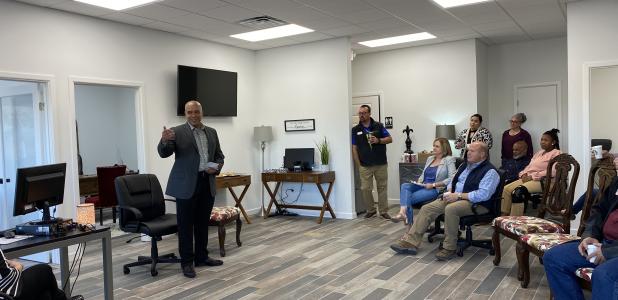Coffee and Commerce attendees talk real estate market
By LYNETTE SOWELL
Cove Leader-Press
At last Friday’s Coffee & Commerce hosted by Cloud Real Estate, local businesspeople had the opportunity to discuss the local real estate market and the effects of not only the pandemic, but the supply chain issues, and everyday supply and demand.
Realtor Nelson Bonilla led the talk. Bonilla has been in the local area more than 30 years and is the son of a retired veteran. He knows the area and has witnessed its growth along with the changes to the real estate market, both residential and commercial.
He said he wished he’d gotten into real estate sooner, and that it’s not something that’s taught in school. When it comes to real estate, it’s not just about selling, it’s also about investing and purchasing, and that they all work hand in hand together.
Bonilla said that homes in the greater Killeen area are going for an average of $250,000, with the Salado area going for $400,000. Copperas Cove market is similar to that of Killeen.
“Your city is going to dictate how long this market is going to last. Of course, with the pandemic, it didn’t help any, and with supply and demand. So until that frees up, we’re going to continue on this road,” Bonilla said.
He also discussed how the drift of homebuyers from the Austin area is affecting the local market, particularly with Tesla bringing in thousands of jobs into the Austin market.
“These are not low-income jobs. They are over $100,000 – easy – and they are pushing others out of the Austin market who can’t live there any longer because they can’t afford it. So, they are coming here,” Bonilla said.
Additionally, many companies have transitioned to remote working because of the pandemic.
“Why live in a city you can’t afford when you can work remotely?” Bonilla said.
One question was asked about a homeowner looking to purchase a newer, larger home, and how to buy the newer home while trying to sell the older home.
Bonilla said there are programs to help people stay in their current home as they look for another one, and that a home buyer/seller should consult with their agent.
Deborah Cloud Beene said also as people consider their homes, they should consider where they’re putting their money into that investment.
“We had a discussion about solar panels. Don’t get yourself in trouble with a big investment like that. Seriously consider the pros and cons, so you don’t get yourself in a position that you can’t sell or you find it very difficult to sell. Put the brakes on things like that,” she said.
Bonilla echoed that statement, that homeowners should consider upgrades that will maximize their return on investment.
“There are certain things that don’t add value to what you’re doing. You don’t want to lock yourself up with solar panels, $40,000 worth of solar panel money that either you’re going to have to pay off or your buyer will have to pay it for you,” Bonilla said. “If you’re going to upgrade with your home, think about what you‘re putting your money into.”
Timing is also essential when making those upgrades, especially now.
Trae Cunningham said that he has been working to replace the flooring in his home and was speaking with another gentleman at Lowe’s, who had torn out his countertops as he planned to sell his home. However, due to supply issues and shipments, he still can’t install his new countertops.
“For two months now he’s been waiting, and he’s a month-and-a-half behind on the carpet. He said, ‘My house is sitting there and I can’t do anything , I may have to sell it -as-is.’”
Bonilla said there are similar issues with new homes.
“We’re running into that with everything. With new builds, you’re getting a new house, the house of your dreams, you’ve moving in, but no refrigerator. Sometimes you can’t get a refrigerator with a new home.”
Bonilla offered another bit of information, that it’s not true that first-time homebuyers need 20 percent down payment to buy their first home.
“There are programs out there for first time homebuyers,” he said. “I always tell people to stop paying someone else’s bill.”
Beene added that for homebuyers, there is a difference between the amount someone qualifies for to buy a home, and what they feel comfortable paying.
“Just because you qualify for it, doesn’t mean you have to get it. There is no sense in maxing out, especially in today’s market…yes, don’t let your home own you,” she said. “We’re here for the long term and we want to be able to see people in the grocery store and not be embarrassed that they can’t afford to take their kids to the movies, because they are maxed out on their home.”

